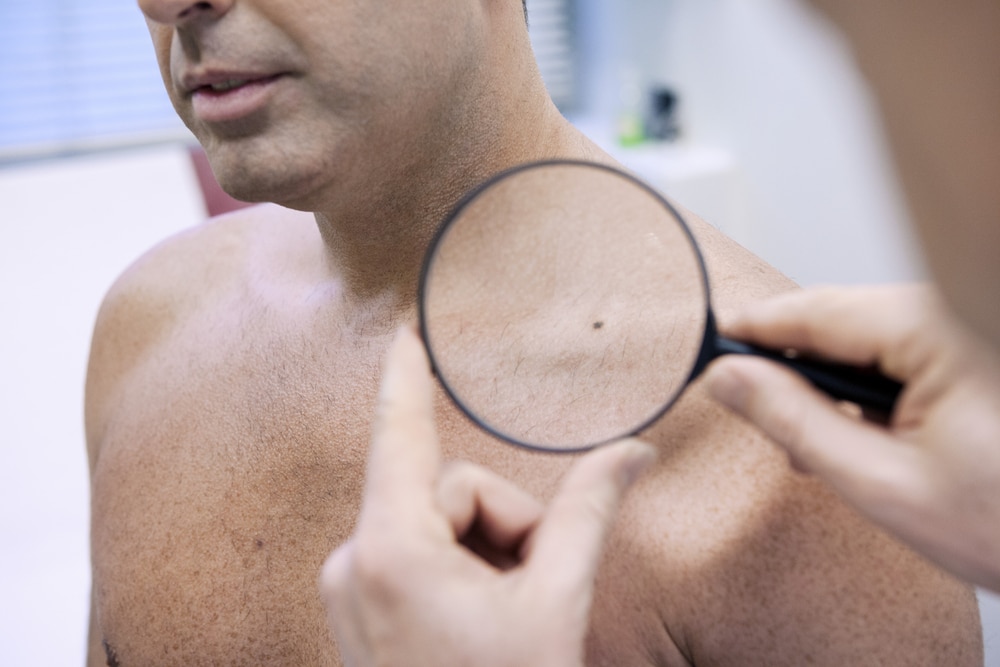Skin cancer awareness has increased among young people in recent years, and the importance of annual skin cancer screenings is widely known. Still, skin cancer has been rising rapidly over the last 30 years in the United States, according to the American Academy of Dermatology Association (AAD), and men are topping the charts. But, why is it that men are more at risk of developing skin cancer than women? A Dermatologist explains.
What Gender Is Most Likely to Get Skin Cancer?
Reportedly, men below the age of 49 have a greater probability of developing melanoma than any other cancer. The AAD states that melanoma hits men harder than women, possibly because men have thicker skin with less fat than women, making their skin more susceptible to sun damage. Another big issue is that men are less knowledgable about how to protect their skin from the sun, so they don't conduct at-home skin checks, get yearly Dermatologist exams, or wear sunscreen every day.
Pair that with the fact that men are more likely to have occupations that require extensive exposure to ultraviolet (UV) rays, like landscaping, construction, truck driving, etc., and you have a recipe for disaster. Yet, there is a way to drive down these numbers with regular screenings.
Skin Cancer Screenings: What Can Men Expect?
It may be surprising to learn that skin cancer is the easiest cancer to identify and treat. That's because it starts where you can see it. Put simply, early detection of skin cancer saves lives. Scheduling a Dermatologist appointment once a year—or more often if you're at higher risk—is a good place for men to start getting serious about their skin health. The skin cancer screening process is essentially the same for women as it is for men. Here's what you can expect when you have your skin examined by a Dermatologist:
- You'll undress down to your underwear and put on a gown.
- Your Dermatologist will conduct a full-body exam, looking closely at your skin from your scalp to your toes, taking note of anything that stands out to them.
- If your Dermatologist discovers precancerous cells, they will treat them with liquid nitrogen. If they come across concerning lesions or moles, they will biopsy the spot and send it to a specialist for testing. Results could take a few days, but you'll learn if the spot is negative or positive for cancer cells.
- Once the exam is over, your Dermatologist will discuss any findings with you and give you a chance to ask any questions. Then, they'll likely ask about your skin care routine and what you're doing to stay safe from the sun.
In between your annual Dermatologist visit, you should do at-home self-skin checks. These checks can be done in front of a full-length mirror to check areas of your body that are often exposed to the sun, like your head, ears, nose, neck, and arms. Then, you can use a handheld mirror to see hard-to-reach places because melanoma can appear anywhere on the body, regardless of sun exposure. Pay close attention to any spots, and keep tabs on potential skin cancer symptoms, noting any changes in size or shape, asymmetrical appearance, irregular border, or uneven color.
Are Skin Cancer Screenings Enough?
Skin cancer screenings are essential, but these exams alone are not enough to reduce your risk of skin cancer. The only way that skin cancer numbers for men will decrease is with continuous prevention efforts.
For many, they might not even realize just how much UV exposure they get in a single day. If you work outside, you should cover up your skin with ultraviolet protection factor clothing, and wear sunglasses and a wide-brimmed hat (especially if you're bald). If you work in an office setting, don't think you're off the hook. When commuting to and from work or school, sitting at your desk by a window, or in front of your computer screen, you're exposed to a great deal of harmful UV light. The UV Stick Broad-Spectrum SPF 50+ is a handy product to keep in your desk drawer for easy application.
If you're not used to wearing sunscreen every day, chat with the EltaMD Elyse to identify a sun and skin care routine that's right for you. The EltaMD UV Sheer Broad-Spectrum SPF 50+ is a popular sunscreen for men because it's lightweight, hydrating, and doesn't leave a white cast on facial hair. Whatever product you choose, just make sure it includes an SPF of at least 30. When you love your sunscreen, you'll be much more likely to apply it—and reapply—regularly.
By spreading awareness and making sun safety easier than ever, it is possible to end this trend of increased skin cancer in men.
